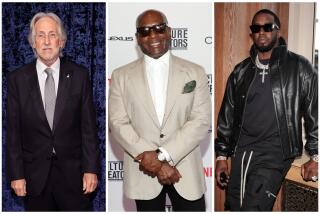NAACP Chief Denies Harassment Allegations : Litigation: Chavis will fight ex-employee’s lawsuit. He defends using group’s money in settlement with woman.
- Share via
ATLANTA — NAACP Executive Director Benjamin F. Chavis Jr. asserted his innocence Sunday and vowed to fight allegations of sexual harassment and discrimination that have resulted in a lawsuit against the civil rights group and in calls for his resignation.
“I know full well that the plaintiff’s accusations are completely false and have no merit,” Chavis said. He said he agreed in November to a financial settlement totaling more than $300,000 to protect the organization from “false and slanderous allegations.”
“We do not intend to allow these false allegations to usurp my energy or commitment to continue to lead the NAACP in the positive direction we embarked upon 18 months ago,” he said.
The 46-year-old Chavis has been under fire since he was appointed executive director of the 85-year-old civil rights organization in April, 1993. He has been criticized for leading the National Assn. for the Advancement of Colored People in directions that some of its board members consider radical. The lawsuit and disclosure that he had agreed to a financial settlement without informing the board has further wounded him within the organization.
NAACP national board Chairman William F. Gibson, a staunch Chavis supporter, said he became aware of the employee’s complaints in late 1993 and left the matter up to Chavis to handle as he saw fit. “Dr. Chavis had complete executive authority to address the administrative complaint,” Gibson said.
“The role of the board of directors of any organization is to guide its philosophy and overall mission. The CEO is responsible for implementation of the policies, recommendations of appropriate goals for the organization and administration of the day-to-day operations.”
Some members of the organization’s 64-member board were particularly disturbed that they had not been informed of the lawsuit at the group’s annual convention last month in Chicago, where Chavis was asked about pending lawsuits.
But Chavis did not at that time know of the lawsuit, said his attorney, Abbey Hairston, who said she’d decided it was “not important enough” to disturb convention preparations by informing him.
The lawsuit was filed June 29 in Washington and served on the organization’s Washington office June 30, but it wasn’t forwarded to Hairston’s law firm until the week of July 4, she said. When she tried to contact Chavis, she learned that he and other top leaders in the organization were in Chicago preparing for the convention.
“I made the decision not to disturb Dr. Chavis with a lawsuit that had no merit,” she said. As a result, most members of the board learned of the lawsuit, the harassment complaints and the financial settlement from news reports.
In the lawsuit, Mary E. Stansel, a former NAACP employee, accuses Chavis of reneging on a promise to help her find a better job outside the organization. While Hairston stressed that sexual harassment is not an issue in the lawsuit, Chavis agreed to a $332,400 financial settlement last year after Stansel accused him of harassment and threatened to sue the organization.
Chavis agreed to pay Stansel two installments of $25,000 each and then $5,400 a month for six months. Chavis further promised to help Stansel find a job outside the NAACP and to pay her an additional $250,000 if she did not have a job offer after six months.
Gibson said Stansel had received $82,400 as of June 30. “Of that amount, $64,000 came from NAACP funds. The other $18,400 beyond the NAACP cost was covered by friends of the organization who made contributions to avoid that additional financial impact on our institution.”
He would not identify the donors.
Chavis did not pay the additional $250,000 because it was determined that he had fulfilled his obligation to help her find a job with the federal government by circulating her credentials to federal agencies, Hairston said. “Dr. Chavis has absolutely no authority to dictate to the federal government who they should hire for employment,” she said. “Everything that the NAACP was supposed to do was done.”
Only one agency agreed to interview Stansel, and that agency chose not to offer her a job, Hairston said.
Alleging that Stansel was not qualified for the level of employment she was seeking and that she did not cooperate with attempts to find her a job, Hairston said the NAACP filed a countersuit July 20 seeking unspecified damages.
Stansel, who has an unlisted phone number, was not available for comment Sunday.
Hairston said in an earlier interview with The Times that Stansel, a lawyer, had been “embittered” after she was not permanently hired at the end of a six-week temporary position last year.
Chavis, branding Stansel’s lawsuit as “frivolous,” said: “Faced with threats of serious and unfounded charges against the NAACP, I made an administration decision to protect the NAACP from exposure to false and slanderous allegations by entering into an out-of-court agreement and settlement designed to resolve the matter and avoid debilitating injury to the NAACP.”
He added: “I do not minimize the harm of sexual harassment when it happens. I have spent over 34 years of my life in the civil rights movement fighting against racial and sexual injustice. . . . I would not want the great work of the NAACP to be distracted by a frivolous lawsuit.”
After Chavis was appointed, he quickly came under attack for reaching out to such black nationalists as Angela Davis and to Louis Farrakhan, the controversial black Muslim leader. Some board members criticized Chavis earlier this year when they learned that the organization had accumulated a $2.7-million deficit, which has since grown to nearly $3 million.
He won vindication of sorts at last month’s NAACP convention in Chicago, where he defeated an attempt by one of his harshest critics to join the national board. He also won a vote of confidence when delegates approved his initiative to expand the organization’s reach to South Africa, despite the group’s financial difficulties.
On Friday, some members of the board criticized Chavis for entering into the financial agreement without prior board approval. Mark Steppe, a board member in Detroit, called it “a moral fraud.”
But, speaking at a news conference in Atlanta before reporters attending a joint convention of African American, Latino, Asian and Native American journalists, Chavis said: “We are confidant that we will prevail and be completely vindicated.” In his first public comments on the controversy, he was flanked at the podium by his wife and several members of the NAACP national board. Chavis had been out of the country until Saturday.
More to Read
Sign up for Essential California
The most important California stories and recommendations in your inbox every morning.
You may occasionally receive promotional content from the Los Angeles Times.













